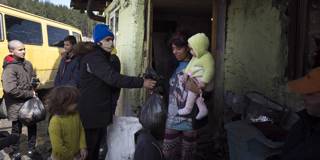 Jodi Hilton/NurPhoto via Getty Images
Jodi Hilton/NurPhoto via Getty Images
瘟疫会导致饥荒吗?
华盛顿—新型冠状病毒给富裕国家所带来的健康和经济冲击正开始波及发展中世界。但我们不应该认为,富裕国家的政策应对对发展中国家也是最好的,甚至未必是可行的。相反,我们应该预料到,贫穷国家会出现更加残酷的权衡和更加艰难的约束。
诚然,待在家中大大有利于减缓病毒在发展中国家的传播,一如富裕国家。但保持社交距离可能带来高昂的代价,特别是对于穷人而言,他们储蓄很少,食物储备也不足,并且(通常每天都是)手停口亦停。很少有人能够通过在家办公生存。
许多穷人所面临的不仅仅是我们所熟悉的经济福利与个人健康之间的残酷权衡。还有一个两种健康角度之间的权衡:因病毒而导致的疾病,以及因经济隔离和市场和机构破坏(包括私人社保)所造成的饥饿和营养不良。
https://prosyn.org/w8F3B1Rzh
To continue reading, register now. It’s free!
Register Now
Already have an account?
Log in



华盛顿—新型冠状病毒给富裕国家所带来的健康和经济冲击正开始波及发展中世界。但我们不应该认为,富裕国家的政策应对对发展中国家也是最好的,甚至未必是可行的。相反,我们应该预料到,贫穷国家会出现更加残酷的权衡和更加艰难的约束。
诚然,待在家中大大有利于减缓病毒在发展中国家的传播,一如富裕国家。但保持社交距离可能带来高昂的代价,特别是对于穷人而言,他们储蓄很少,食物储备也不足,并且(通常每天都是)手停口亦停。很少有人能够通过在家办公生存。
许多穷人所面临的不仅仅是我们所熟悉的经济福利与个人健康之间的残酷权衡。还有一个两种健康角度之间的权衡:因病毒而导致的疾病,以及因经济隔离和市场和机构破坏(包括私人社保)所造成的饥饿和营养不良。